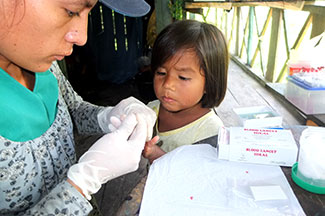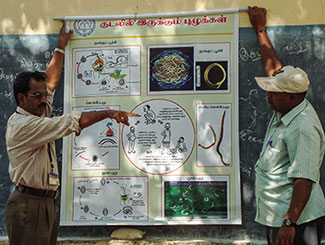
Scientists gather to celebrate Fogarty's Global Infectious Diseases research training program
November / December 2017 | Volume 16, Issue 6

Photo by Beronica Infante, Cayetano Heredia University
Fogarty’s Global Infectious Disease (GID) program develops
international research partnerships aimed at building
expertise so developing country scientists can conduct
independent infectious disease research in their home
countries.
international research partnerships aimed at building
expertise so developing country scientists can conduct
independent infectious disease research in their home
countries.
From India to Uganda, Fogarty’s Global Infectious Disease (GID) research training program has launched successful research careers around the globe, grown capacity, paved the way for groundbreaking discoveries that save lives everywhere, including in the U.S., and even reversed brain drain from low- and middle-income countries (LMICs), researchers said at a recent meeting to mark five decades of Fogarty’s existence.
"Programs like the GID have had an incredible track record in training leaders in Fogarty’s first 50 years," said Dr. Richard L. Guerrant, the lead of a long-running GID program at the University of Virginia, which has trained more than 80 scientists in Brazil, South Africa and Tanzania. "All of our GID trainees have returned home after their training, all have taken on leadership roles at their research institutions or started companies, and all have published numerous papers, another benchmark of leadership."
But the most laudable outcome of GID collaborations, said many of the attendees, is how it brings people together and imbues scientists with a global outlook. "The GID program allows researchers from Africa or Asia to collaborate with people from the U.S., and has scientists from different disciplines working together to solve problems - immunologists with microbiologists, pediatricians with psychiatrists," said Dr. Paul Bangirana of Makerere University in Uganda. "Like all Fogarty programs, the GID teaches us that the issues we study are global problems, not just local African or Asian problems. They affect everyone, everywhere and to beat them, we need to keep research programs like the GID going."
The GID program pairs U.S. and LMIC institutions to provide research training to scientists who work with non-HIV infectious diseases that, although rare in the developed world, continue to have a harsh impact in developing countries. The program aims to build the expertise required so LMIC scientists can conduct independent infectious disease research in their home institutions.
More than 1,200 researchers have been trained under the GID program since it was launched in 2003. Between them, they have contributed to or been the lead authors on thousands of publications, some announcing groundbreaking global health advances. Dr. Reinaldo Oria, who trained at UVA, was part of the team that made the "incredible discovery," in Guerrant’s words, that a major risk-factor for Alzheimer's disease, the APOE4 allele, appears to play a protective role in the cognitive and physical development of children living in Brazil’s favelas who have heavy burdens of diarrhea. A finding by GID trainees in Peru that fever along with pulmonary hemorrhage was associated with leptospirosis - not, as long believed, with tuberculosis - helped change clinical practice, said Dr. Joe Vinetz, the co-lead of the GID-supported program run by the University of California, San Diego, and Cayetano Heredia University in Peru. "People who present with these symptoms are now treated immediately for leptospirosis," he said. "This change has saved countless lives."
Like many Fogarty programs, the GID is multigenerational, with former trainees becoming mentors to other scientists embarking on research careers. Since receiving a GID training fellowship in 2007, Dr. Rajiv Sarkar has progressed from a trainee investigating childhood enteric infections in communities in India to a co-investigator on a multi-country project seeking to interrupt the spread of soil-transmitted helminths - some of the most common parasites in the world - in endemic communities. More than 830 million children live in areas with active transmission of parasites, and urgently need treatment and preventive interventions.

Photo courtesy of Dr. Deepthi Kattula, CMC Vellore
Fogarty’s Global Infectious Disease program has trained
generations of developing country scientists, including
in India.
generations of developing country scientists, including
in India.
"Without the support and guidance from my mentors on the GID program, I would not have been able to advance my research career to the extent that I have," said Sarkar, of the Christian Medical College in Vellore, India.
At the University of Malawi, GID and other Fogarty support has helped grow the medical school from a tiny program staffed predominantly by foreigners that graduated around a dozen master’s students a year in the 1990s, to one where 90 percent of the faculty are Malawians. About 250 students graduated in 2015, including 11 from two Ph.D. programs.
By providing small re-entry grants to researchers who return to Malawi after obtaining advanced degrees abroad, Fogarty has also helped to reverse brain drain, said Dr. Victor Mwapasa, who is co-lead on a Fogarty-supported project that is training faculty and junior investigators in implementation science skills. Had Fogarty not provided seed funding after Mwapasa completed his studies in the U.S., he said he would not have returned to Malawi.
Fogarty support helps "build a critical mass of people that allows us to continue to develop research capacity at Cayetano Heredia University," said Dr. Dionicia Gamboa, the co-director with Vinetz of the Peruvian university’s GID program. "The GID and other Fogarty programs have a multiplier effect, allowing us to continually develop the next generation of researchers. The global aspect of the programs allows us to share our results widely, which helps us get more funding and more partners, which, in turn, lets us learn even more and share experiences in the lab and the field.’’
More Information
- Fogarty's Global Infectious Disease (GID) research training program
- Related Fogarty-supported projects (in NIH RePORTER):
- Global Infectious Disease Research Training Program at UVA
Principal investigator: Dr. Richard L. Guerrant - APOE and the Effects of Malnutrition on Cognitive and Intestinal Development
Principal investigator: Dr. Richard L. Guerrant - Related publication: APOE4 protects the cognitive development in children with heavy diarrhea burdens in Northeast Brazil
Pediatric Research, December 20, 2004 - Leptospirosis transmission in the Peruvian Amazon
Principal investigator: Dr. Joseph M. Vinetz - Building Enteric Infectious Disease Research Capacity in India
Principal investigator: Dr. Gagandeep Kang - Malawi HIV Implementation Research Scientist Training Program
Principal investigator: Dr. Mina Christine Hosseinipour - Related GID grantee news:
- Malaria vaccine candidate produced from algae
UC San Diego News, February 18, 2015 - BMC awarded NIH grant to train Ugandans in basic research on TBBoston University Medical Center news, June 16, 2014
- An American doctor may have solved a deadly mystery about malariaPRI's The World, May 5, 2014
- Chagas research champion wins hearts and mindsTDR news, April 4, 2014
To view Adobe PDF files, download current, free accessible plug-ins from Adobe's website.






















.png)











No hay comentarios:
Publicar un comentario